Key takeaways:
- The Covid pandemic heightened feelings of isolation, contributing to increased depression.
- Recognizing signs of depression, like changes in sleep and loss of interest, is crucial for seeking help.
- Establishing a daily routine, engaging in physical activity, and talking to friends or therapists are effective strategies for overcoming depression.
- Support resources, including hotlines and online therapy, have become essential for mental health assistance during the pandemic.
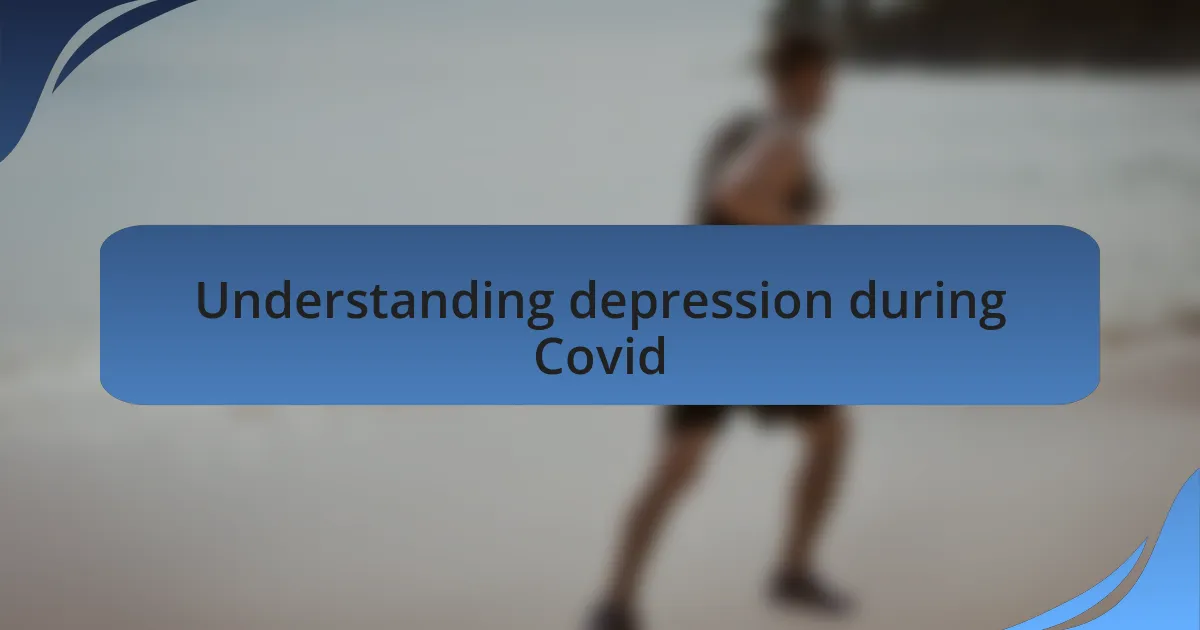
Understanding depression during Covid
During the Covid pandemic, many people experienced heightened feelings of isolation, which can be a major contributing factor to depression. I, too, found myself grappling with moments of loneliness, wondering, “Is anyone else feeling this way?” It’s a common experience that often goes unspoken, but acknowledging it can bring a sense of relief.
The uncertainty of life during Covid can amplify feelings of hopelessness. I recall staring at the same four walls day after day, and it struck me how this seemingly mundane environment became a reminder of what I was missing — connection, spontaneity, and even simple outings. It left me asking myself, “When will things feel normal again?” This longing for normalcy can deepen the darkness of depression.
It’s important to remember that depression manifests differently for everyone, especially during such unprecedented times. Some days were harder than others for me to even get out of bed, while on other days, I felt a flicker of motivation to create or connect. Recognizing these patterns in our emotional responses can help us understand what we’re going through and encourage us to seek support when we need it.
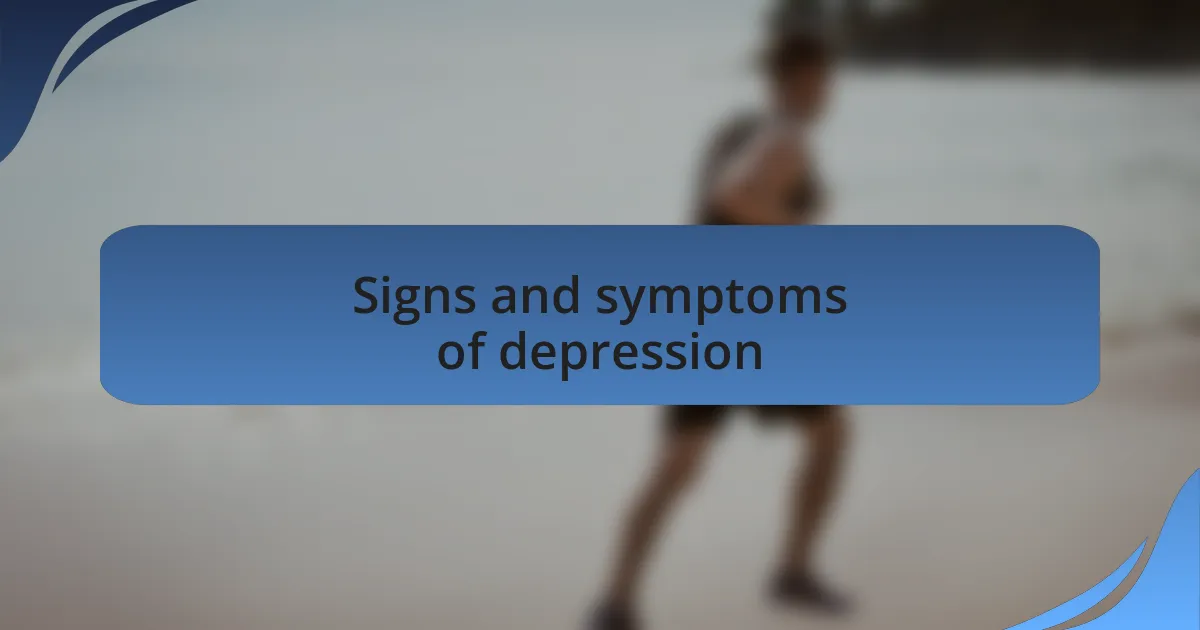
Signs and symptoms of depression
Depression can often be elusive, presenting itself through a variety of signs and symptoms that might go unnoticed at first. I remember feeling a heaviness in my chest, a sense of fatigue that was not just physical but emotional too. It left me wondering, “Why does getting out of bed feel like climbing a mountain some days?” Such ongoing fatigue can blur the line between tiredness and deeper emotional turmoil.
Changes in sleep patterns can also be a significant indicator. For me, there were nights when I would lie awake, lost in thought, and other nights when I would sleep endlessly, yet wake up feeling exhausted. I often caught myself reflecting, “Is this rest, or is it an escape?” It’s crucial to recognize that whether it’s insomnia or oversleeping, these shifts can be signs that something more profound is at play.
Additionally, loss of interest in activities that were once enjoyable is a symptom I can relate to. I used to love painting, but during rough patches, the canvas would sit untouched, gathering dust. I frequently questioned, “What happened to the joy I once found in this?” Acknowledging this disconnection can be unsettling, but it serves as a vital reminder to check in with ourselves and seek the support we may desperately need.
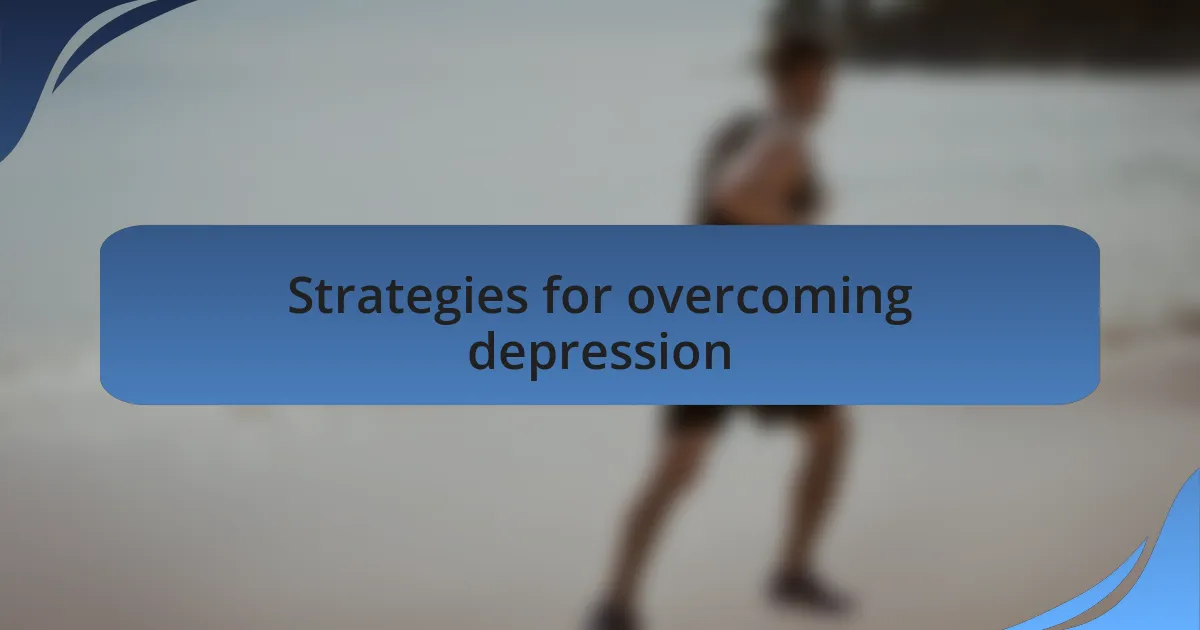
Strategies for overcoming depression
Finding effective strategies to overcome depression can be challenging, yet immensely rewarding. One method that I found particularly helpful was establishing a daily routine. At my lowest points, simply having a structure to my day provided a sense of purpose. I remember thinking, “If I can just complete one small task, that’s a victory.” This simple practice of breaking my day into manageable parts made moments of despair feel less overwhelming.
Another valuable approach for me was the importance of physical activity. It wasn’t just about going to the gym; even a short walk in the fresh air could shift my mood. I often felt the weight of the world lifting with each step, as if nature was reminding me that I am not alone in this struggle. How can something so simple have such a profound effect? Engaging in physical activities releases endorphins, those feel-good hormones, which can significantly enhance our mood.
Lastly, I found comfort and connection in talking to friends or a therapist. I recall a moment when I hesitated to share my feelings, thinking, “Will they understand?” However, opening up about my experiences brought me unexpected relief and support. It’s in these conversations that we often realize how shared our struggles are, reminding us that reaching out can be an essential part of healing.
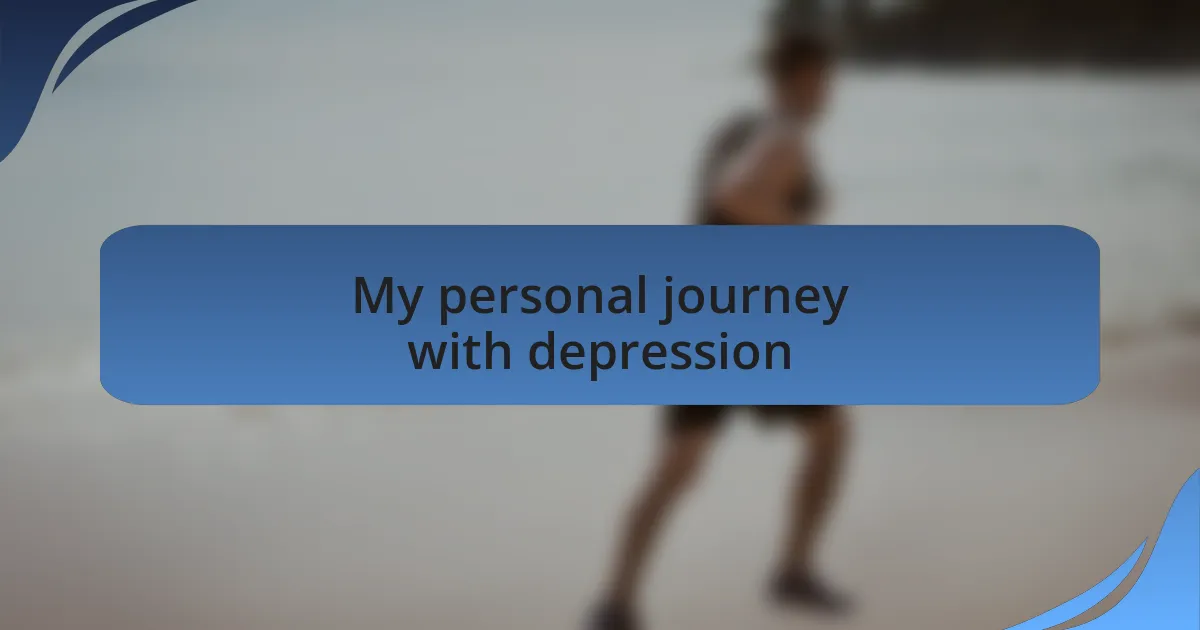
My personal journey with depression
The silence of depression can feel so isolating. I can vividly recall sitting on my bedroom floor one evening, feeling like I was in a fog that I couldn’t escape. In that moment, it struck me: I was not just battling an uncomfortable feeling; I was fighting the very essence of my own joy. Have you ever felt like you’re stuck in a place without a clear path out? I learned that sharing these burdens with someone—whether it was a friend or a therapist—helped to dim that heavy weight, at least a bit.
In my journey, music played a surprisingly powerful role. When I felt too low to lift my head, I turned to songs that resonated with my feelings. I remember lying in bed, headphones on, crying to lyrics that mirrored my internal chaos. It felt like a release. Have you found something that helps you connect to your emotions? For me, it wasn’t just about listening; it became a form of expression, reminding me that others experienced similar battles.
There were days when simply getting out of bed felt monumental. I’d often reflect on how I could muster the energy to face a world that felt unbearably heavy. But as I began setting small goals—a shower, a cup of coffee—I realized that each little step brought a flicker of light. It’s amazing how those tiny victories can shift your perspective, isn’t it? They served as a reminder that even on the bleakest days, I had the power to reclaim a fragment of my life.
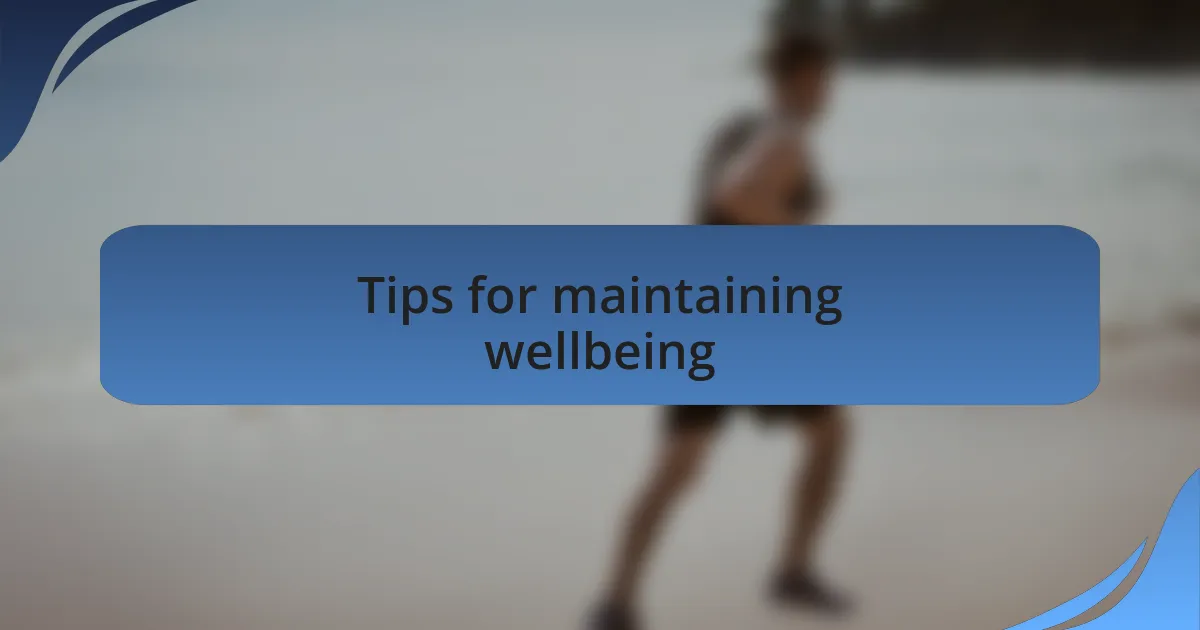
Tips for maintaining wellbeing
Engaging in regular physical activity became one of my most vital strategies for maintaining wellbeing. I remember the first time I went for a walk after weeks of feeling stagnant. The fresh air filled my lungs and, surprisingly, each step felt like shedding a tiny piece of my burden. Have you ever noticed how movement can shift your mood? Even a short, brisk walk can create a sense of accomplishment and clarity.
In my experience, establishing a routine transformed my chaotic days into something manageable. When I would structure my day with small, achievable tasks—be it cooking a meal or picking up a book—I felt a renewed sense of control. It’s remarkable how creating a rhythm in your daily life can cultivate a sense of balance, isn’t it? By surrounding myself with positive habits, I was better equipped to navigate the waves of emotion that depression often brings.
Lastly, I discovered the importance of practicing gratitude, even on my toughest days. I started a simple journal where I jotted down three things I was thankful for each evening. Some days it was as simple as the warmth of my blanket or a phone call from a friend. I found that focusing on the positive helped to shift my mindset, creating space for hope and resilience. What small joys can you celebrate today?

Resources for Covid related support
Many organizations have stepped up during the pandemic, offering resources specifically tailored for mental health support. I remember the relief I felt when I discovered hotlines like the National Suicide Prevention Lifeline, where trained counselors are available 24/7. Have you ever felt that sense of comfort knowing someone is just a call away, ready to listen?
Additionally, online therapy platforms surged in popularity, providing convenient access to professional help without the stress of commutes. I tried a few of these services, and it amazed me how effective virtual sessions can be. It’s a great option for those who may hesitate to seek help in person. Do you think there’s something unique about sharing feelings from the comfort of your own space? It certainly made me more open and honest.
Finally, there are numerous online communities, such as support groups on social media, where individuals share their experiences and coping strategies. I found these spaces to be uplifting, where vulnerability is embraced, and collective healing happens. Have you ever experienced the strength of connection with others who understand your journey? It’s powerful to know you’re not alone on this path.